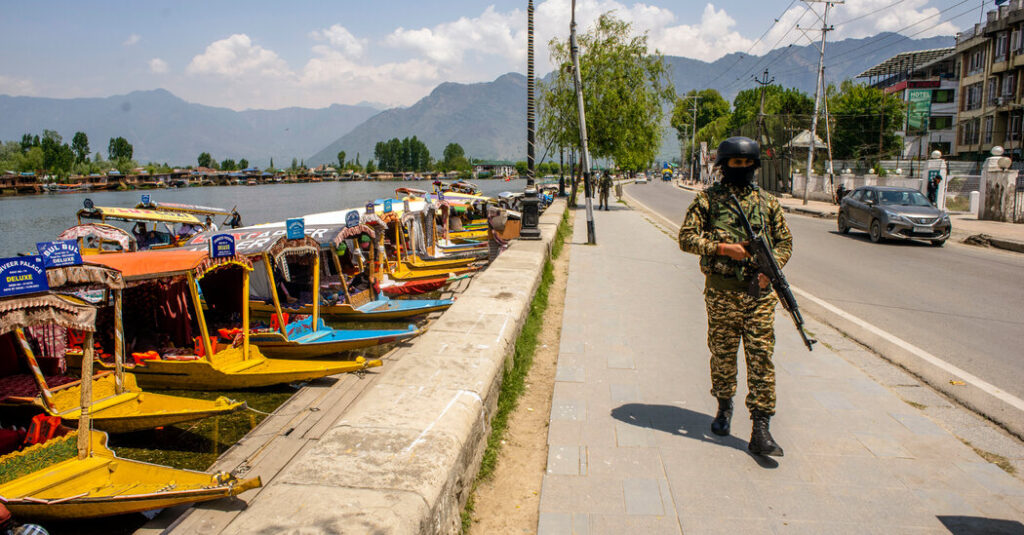Following the tragic terrorist attack in Kashmir last week, Indian Prime Minister Narendra Modi has contacted more than a dozen world leaders via phone. According to officials, diplomats from 100 missions in India’s capital have gathered for briefings at the foreign ministry.
However, this effort isn’t primarily about seeking assistance to ease India’s escalating tensions with Pakistan—which it accuses of having “links” to the attack. Instead, as informed by four diplomatic officials, India seems to be preparing a case for potential military action against its rival. While not explicitly naming Pakistan, Modi promised severe consequences and the destruction of terrorism strongholds in a speech on Thursday.
Five days after the attack, which resulted in the deaths of 26 civilians, India has not officially identified any group as responsible, providing scant evidence for its claim that Pakistan was behind the incident. The Pakistani government has denied any involvement.
During diplomatic briefings, Indian officials highlighted Pakistan’s historical support for terrorist organizations that target India. They mentioned that their investigation is ongoing and briefly referred to technical intelligence linking the attackers to Pakistan, including facial recognition data allegedly related to the incident.
Analysts and diplomats noted that the presentations to this point suggest two possibilities: that India may need more time to gather evidence before taking action against Pakistan, or that, amidst global chaos, it feels little obligation to justify its intended actions to anyone.
A military escalation between India and Pakistan, both possessing nuclear arms, carries a significant risk of spiraling out of control. Nevertheless, India seems less constrained by international pressure to temper its response and has been quicker to assert its military strength in recent years, thanks to its growing diplomatic and economic influence.
Both Iran and Saudi Arabia have reached out to mediate between the two nations, with Iran’s foreign minister publicly offering assistance. The United Nations and the European Union have urged for restraint and dialogue. However, major powers like the United States are preoccupied with other issues, leading analysts to believe India perceives support from various nations as a green light for its initiatives.
Officials under the Trump administration have expressed strong support for India’s counter-terrorism efforts. President Trump indicated his amicable relations with both India and Pakistan, acknowledging their longstanding tensions.
However, it remains uncertain how deeply Washington will engage in this conflict. Three months into his presidency, Mr. Trump has yet to appoint an ambassador to India, reflecting the lower priority South Asia holds in his agenda.
Even if the United States or other countries sought to intervene, their influence may be limited. India and Pakistan have fought several wars over the contested region of Kashmir, which both nations claim entirely. New Delhi views the conflict as a strictly bilateral matter with Pakistan.
The initial response from Washington has mirrored the approach taken during the last significant flare-up over Kashmir in 2019, according to Daniel Markey, a senior fellow at the Johns Hopkins University School of Advanced International Studies.
That confrontation was ignited by an attack that resulted in numerous Indian security personnel casualties, with the attackers—a militant group called Jaish-e-Muhammad—clearly identified.
At that time, the Trump administration expressed support for India but only increased diplomatic pressure for restraint after India had struck Pakistan with a cross-border airstrike.
The extent of the damage from that strike was debated, and as Pakistan prepared to retaliate, the two nations engaged in a dogfight that led to an Indian jet being shot down, with its pilot captured.
To avoid a repeat of that mismanaged response, all indications point to India aiming to take decisive action this time, as noted by Mr. Markey. Pakistan has pledged to respond significantly to any strike from India.
“The cycle of retaliation could escalate quickly, and both countries have a tendency to overestimate their capacity to manage such escalation,” Mr. Markey warned.
Unlike the 2019 attack, details concerning the recent tragedy remain unclear, including uncertainties about the number of assailants. A lesser-known group called the Resistance Front claimed responsibility via social media, according to Indian media sources. Indian officials privately allege that this group acts as a proxy for the Pakistani-based terrorist organization Lashkar-e-Taiba.
The ambiguity surrounding the situation may explain why India is predominantly citing Pakistan’s previous support for terrorism in Kashmir to justify a military response. However, some have raised concerns about this approach, given the monumental implications of potential escalation. One diplomat questioned whether it’s prudent to consider war with a nuclear neighbor based solely on historical patterns.
Shiv Shankar Menon, a former national security adviser for India, stated that Modi faces limited options for military action after having responded with strikes against Pakistan in both 2016 and 2019, post-terrorist incidents in Kashmir.
Nevertheless, he expressed confidence that the ongoing tit-for-tat exchanges between the two rivals are unlikely to spiral out of control.
Edward Wong and Jeanna Smialek contributed reporting.


